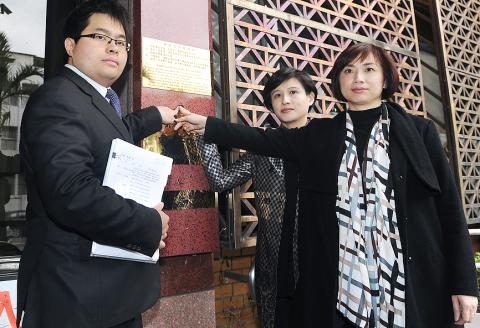A group of Democratic Progressive Party (DPP) legislators and pro-Taiwan advocates yesterday took the Ministry of Education (MOE) to court over its controversial changes to high-school textbook guidelines, filing a lawsuit against Minister of Education Chiang Wei-ling (蔣偉寧) for document forgery at the Taipei Prosecutors’ Office.
Lawyer Huang Di-ying (黃帝穎) said that Chiang on Jan. 27 convened a ministry meeting to review the proposed changes, at which it was concluded that a panel composed of high-school teachers and experts who had discussed the proposal earlier agreed with the “minor adjustments” to high-school textbook guidelines in the fields of language and social studies, which cover three disciplines: history, geography and civics.
However, Huang said that according to various media reports, the 43-member panel actually decided against endorsing the proposed alterations during the meeting.

Photo: Liao Chen-huei, Taipei Times
“That means that Chiang has violated Article 213 of the Criminal Code, which states that a public official who causes injury to the public with the entry of a public document which he knows to be false can be imprisoned from one to seven years,” the lawyer said.
DPP legislators Cheng Li-chiun (鄭麗君) and Ho Hsin-chun (何欣純) urged investigators to seize the audio recording and minutes of the Jan. 27 meeting, which Chiang has refused to turn over.
Many teachers, historians and members of the pan-green camp and the public have voiced strong opposition to the adjusted textbook outlines over what they say is its hidden agenda of “de-Taiwanization and Sinicization” aimed at catering to “Greater China perspective” of the administration of President Ma Ying-jeou (馬英九).
The DPP caucus is planning to submit a proposal seeking to nullify the adjustments at the start of the legislative session today, Cheng said, adding that the public should keep pressuring the ministry until it suspends the initiative.
Ho said that the legislature’s Education and Culture Committee would also demand that the minister step down and be held responsible for the proposal.
The DPP also filed a complaint with the Control Yuan last week over what it termed the Ministry of Education’s “administrative errors.”

Tropical Storm Gaemi strengthened into a typhoon at 2pm yesterday, and could make landfall in Yilan County tomorrow, the Central Weather Administration (CWA) said yesterday. The agency was scheduled to issue a sea warning at 11:30pm yesterday, and could issue a land warning later today. Gaemi was moving north-northwest at 4kph, carrying maximum sustained winds near its center of up to 118.8kph and gusts of 154.8kph. The circumference is forecast to reach eastern Taiwan tomorrow morning, with the center making landfall in Yilan County later that night before departing from the north coast, CWA weather forecaster Kuan Shin-ping (官欣平) said yesterday. Uncertainty remains and

SEA WARNING LIKELY: The storm, named Gaemi, could become a moderate typhoon on Wednesday or Thursday, with the Taipei City Government preparing for flooding A tropical depression east of the Philippines developed into a tropical storm named Gaemi at 2pm yesterday, and was moving toward eastern Taiwan, the Central Weather Administration (CWA) said. Gaemi could begin to affect Taiwan proper on Tuesday, lasting until Friday, and could develop into a moderate typhoon on Wednesday or Thursday, it said. A sea warning for Gaemi could be issued as early as Tuesday morning, it added. Gaemi, the third tropical storm in the Pacific Ocean this typhoon season, is projected to begin moving northwest today, and be closest to Taiwan on Wednesday or Thursday, the agency said. Today, there would likely

DISRUPTIONS: The high-speed rail is to operate as normal, while several airlines either canceled flights or announced early departures or late arrivals Schools and offices in 15 cities and counties are to be closed today due to Typhoon Gaemi, local governments announced last night. The 15 are: Taipei, New Taipei City, Taoyuan, Tainan, Keelung, Hsinchu and Kaohsiung, as well as Yilan, Hualien, Hsinchu, Miaoli, Chiayi, Pingtung, Penghu and Lienchiang counties. People should brace for torrential rainfall brought by the storm, with its center forecast to make landfall on the east coast between tonight and tomorrow morning, the Central Weather Administration (CWA) said. The agency issued a sea warning for the typhoon at 11:30pm on Monday, followed by a land warning at 11:30am yesterday. As of

CASUALTY: A 70-year-old woman was killed by a falling tree in Kaohsiung as the premier warned all government agencies to remain on high alert for the next 24 hours Schools and offices nationwide are to be closed for a second day today as Typhoon Gaemi crosses over the nation, bringing torrential rain and whipping winds. Gaemi was forecast to make landfall late last night. From Tuesday night, its outer band brought substantial rainfall and strong winds to the nation. As of 6:15pm last night, the typhoon’s center was 20km southeast of Hualien County, Central Weather Administration (CWA) data showed. It was moving at 19kph and had a radius of 250km. As of 3pm yesterday, one woman had died, while 58 people were injured, the Central Emergency Operation Center said. The 70-year-old